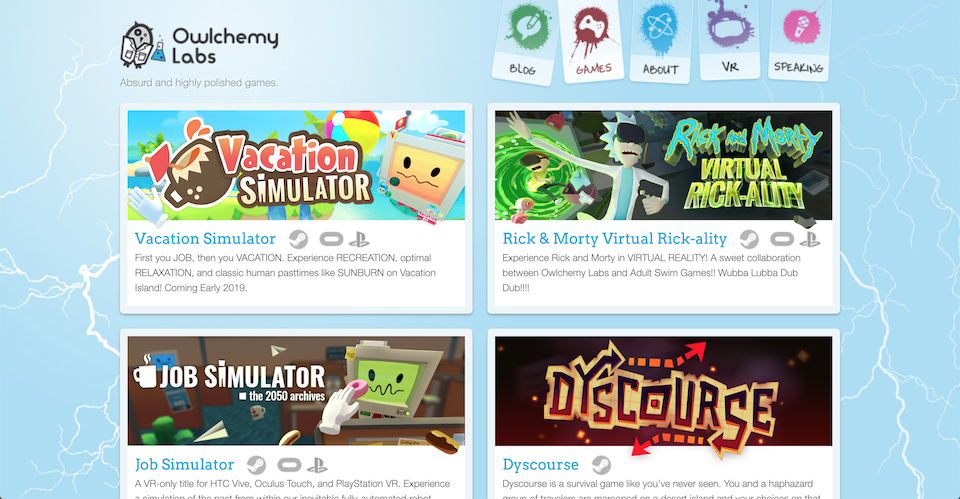
Full disclosure: I am a HUGE Star Trek nerd. I’ve always wanted something like the holodeck to be a reality, and with all the other technology that Star Trek and other sci-fi has inspired/predicted, why can’t it be?
Owlchemy Labs is here to change that. You may know Owlchemy Labs from their hit games Job Simulator and Rick and Morty: Virtual Rick-
First thing’s first: Star Trek fan?
“Of course, though I’m currently a bit behind on Discovery.”
Will we be able to play poker with Einstein, Newton and Hawking? What about solving Sherlock Holmes mysteries?
“I don’t see why not. While something like this probably isn’t going to happen in the near future, advances in artificial intelligence and machine learning make it more and more likely every day. Crossing the uncanny valley means more than just improvements in graphical capabilities and photorealism — characters in VR will require a comprehensive character interaction system in order to be truly realistic. This will require either artificial intelligence or an absurdly large number of development hours in order to hand-author unique interactions. Hopefully AI will improve sooner rather than later to make this possible.”
Okay but for real, how advanced is this technology right now?
“Every day I’m blown away by the unique ways that players interact with our games and expose new insight for the way we design future VR projects. We’re just getting started — the major consumer headsets released in 2016, and the VR industry has been gaining traction ever since. Just like any new technology, adoption rates are only going to increase exponentially, along with the advancement of hardware capabilities and compelling software. To put things in perspective, we’re essentially in the Atari era of VR. The distance from Atari to advanced consumer consoles and what games are capable of is huge. It’s exciting to think that we still have a long way to go to see the full potential of VR.”
What platforms do your programs utilize?
“Currently we focus on development for the HTC Vive, Oculus Rift with Touch controllers and PlayStation VR. At Owlchemy, we believe the most compelling VR experiences exist when players have the ability to physically move in a virtual space and interact with the environment with their hands. To allow for this level of interaction, we only design games for 6DoF (degrees of freedom) platforms with both room-scale tracking and hand-tracking. We want our games to be available to the widest audience as possible and support any platform that meets these criteria. We believe this will be the standard for VR headsets in the futur, and will expand the platforms we offer our games [on] as we see the industry shift in this direction.”
Do you have suggestions for people (mostly me) who get motion-sickness in these environments?
“First suggestion: shout from the tallest rooftop of the internet that you get motion sick in VR so other people who are motion-sensitive know they’re not alone, and developers can’t argue that you don’t exist. Second suggestion: voice that you want VR content that won’t make you sick or, even better, that avoids motion sickness entirely.”
“I hope you see where I’m going with this. It’s a developer’s choice to create VR that makes people sick, and the burden is on them to make their experiences accessible and comfortable for people. We have a great deal of knowledge already about what induces motion sickness in VR, and there’s comfortable content out there that proves it’s possible to avoid it.”
“Our motto at Owlchemy is ‘VR for everyone,’ and this means everyone — regardless of motion sensitivity, able-bodiedness, height, experience level… We’re aware this is challenging, but the mainstream success depends on making ‘VR for everyone.’ Our real suggestion is to developers: choose to make comfortable VR experiences, not ones that make people sick.”
Will “Job Simulator” ever eventually just become the standard for jobs?
“In a post-singularity world, it’s not impossible to think that humans would need to find something to do with their free time. Of course, the other option would be to go on vacation — luckily, we’ve also got that covered in Vacation Simulator.”
Who approached whom for the Virtual Rick-ality game?
“The inception of ‘Rick and Morty: Virtual Rick-ality’ is a funny story, actually. Justin Roiland, the creator of Rick and Morty, got an early look at the HTC Vive headset and loved Job Simulator, raving about it on Twitter. We reached out (also on Twitter) and offered to show the newest jobs in the game, which was at that time still in development and unreleased.”
“Justin met with our founder and, after a few beers and some Indian food, the idea came up of bringing Rick and Morty into VR in a similar manner as Job Simulator. A week later, we were pitching Adult Swim — the rest is history. The match between the Rick and Morty team and Owlchemy couldn’t have been more perfect, and we’re proud of the final product and all the success it’s seen.”
Do you think this technology will eventually become affordable for everyone?
“Absolutely. The technology will only improve from here — headsets will be lighter, wireless, more comfortable to use. VR headset prices have already gone down in price and wireless, standalone headsets that remove the need for an expensive PC are already on the horizon. Smartphones were expensive and out of reach for the majority of consumers at first, but as of 2018 there are an estimated 2 billion smartphones out there. As the industry and market grows, the price will go down, just like any emerging piece of technology hardware before it.”
Do you think we’ll ever reach Ready Player One status?
“In the most literal sense, I sure hope not. Ready Player One is painted as a piece of dystopian fiction, and of course I hope that we don’t move in that direction and find ways to integrate technology into our lives in ways beneficial to society.”
“However, in terms of the immersion RPO presents in the The OASIS and its virtual worlds — high fidelity tracking and sensory inputs, believable environments, capacity for meaningful social interactions. That level of immersion is definitely what we strive to have in VR one day.”
Is there anything else you would like potential attendees to know?
“The time is now to be excited about VR. The best is yet to come, and you should be excited about the potential of VR in the near future, regardless of what industry you come from. We’re at the point in the hype curve where things are going to start paying off. If you haven’t thought seriously about VR until now or even at all, this is your moment.”
For more information about this subject, please check out the Making the Holodeck: Interaction in Room-Scale VR panel on Monday, March 11 at 12:30 p.m. at the JW Marriott, Salon 1-2.

